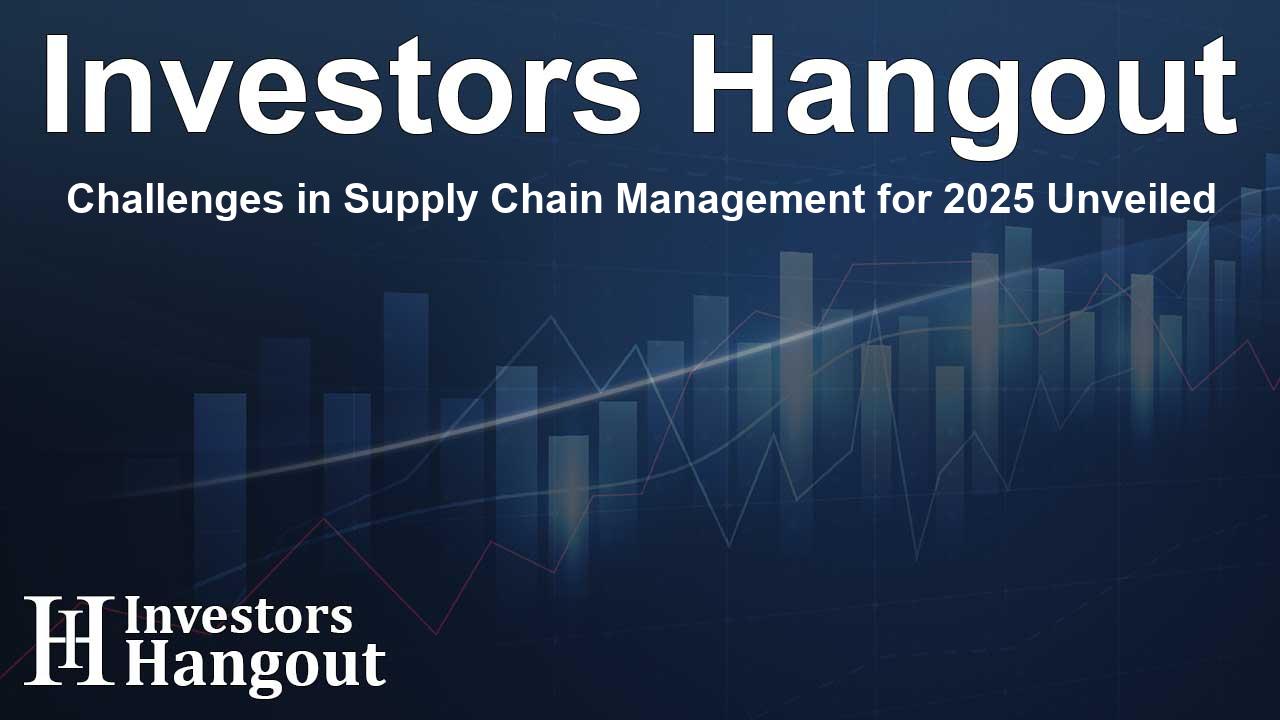Challenges in Supply Chain Management for 2025 Unveiled

Discovering Supply Chain Challenges for 2025
In recent findings, Impinj, Inc. (NASDAQ: PI), a frontrunner in RAIN RFID technology, presents significant challenges supply chain managers may face in the upcoming years. Conducted among 1,000 supply chain professionals, the research outlines a concerning data accuracy gap hindering the ability of organizations to respond to ever-changing market demands. While nearly all supply chain managers (91%) assure their readiness for accurate supply chain management, a mere third (33%) consistently access real-time inventory data. This discrepancy highlights a pressing issue that could impede their operations in addressing counterfeit goods, shrinkage, delivery errors, and navigating sustainability requirements.
Critical Challenges Identified
As the scrutiny on supply chain efficiency grows, the report identifies numerous challenges supply chain managers must prioritize. A startling 52% of respondents expressed concern regarding rapid peaks in customer demand, particularly those influenced by social media trends. Furthermore, the emergence of social media storefronts, along with the burgeoning thrift movement, adds layers of complexity for managers to navigate. Understanding these nuances is crucial for sustaining a competitive edge in the market.
Combating Counterfeiting and Shrinkage
Addressing Counterfeit Goods
Among the most daunting challenges for supply chain managers is tackling counterfeit goods entering the market. Notably, 65% of survey participants indicated that counterfeits pose significant threats to their operations. In light of this, 98% of retail supply chain professionals are implementing different strategies, such as utilizing technology to authenticate goods in transit and incorporating verification checkpoints, reinforcing the need for robust anti-counterfeiting measures.
Mitigating Shrink and Theft
Shrink and theft remain urgent concerns for retail supply chain managers, with 60% acknowledging the severity of this issue. To combat these challenges, 99% are investing in robust security measures, such as enhancing security during transit and deploying innovative tracking technologies to safeguard their assets. Such commitments underscore the pressing necessity for secure supply chain practices.
The Impact of Technology on AI Implementation
The ongoing struggle with data inaccuracies poses significant barriers to integrating artificial intelligence (AI) effectively into supply chains. The report emphasizes that data accuracy ranks as the top obstacle, reported by 43% of managers, followed closely by data availability and real-time access challenges. To fully harness the potential of AI, organizations need to prioritize these essential elements, ensuring their insights are timely and correct.
Pursuing Sustainability Initiatives
Another critical focus for supply chain managers is sustainability. Over 27% reported facing challenges in minimizing the environmental impacts of their supply chains, while 25% noted struggles with compliance regarding stringent environmental, social, and governance (ESG) regulations. To navigate these hurdles, many organizations are strategizing their sustainability approaches, including enhancing last-mile delivery efficiency and introducing recycling initiatives.
About the Survey
The research, which analyzed the responses of 1,000 supply chain professionals at director levels and above, reveals a multi-faceted perspective on the state of supply chain integrity in 2025. Key industries represented include retail, food and grocery, and transportation and logistics. This analysis sheds light on the key performance indicators that define a reliable supply chain.
About Impinj
Impinj (NASDAQ: PI) empowers organizations by efficiently connecting everyday items to the Internet through RAIN RFID technology. This vital connection allows entities to analyze and optimize their operations, ultimately facilitating a seamless Internet of Things environment. The company strives to provide meaningful data that drives decision-making and enhances overall supply chain resilience.
Frequently Asked Questions
What is the main focus of Impinj's recent research?
The research focuses on identifying the challenges faced by supply chain managers in 2025, particularly emphasizing the importance of data accuracy and visibility.
What percentage of supply chain managers feel they can ensure visibility?
A majority of supply chain managers, around 91%, are confident in their ability to provide accurate visibility, despite challenges highlighted in the report.
How are counterfeit goods impacting supply chains?
Counterfeit goods pose a significant threat, with 65% of supply chain managers acknowledging it as a challenge, prompting substantial investment in anti-counterfeiting technologies and strategies.
What are the sustainability challenges faced by supply chain managers?
Sustainability challenges include reducing environmental impact and complying with strict ESG regulations, which over a quarter of managers find difficult.
How is Impinj addressing these supply chain challenges?
Impinj focuses on providing real-time data through RAIN RFID technology, enabling enhanced visibility and accuracy in supply chain processes.
About The Author
Contact Kelly Martin privately here. Or send an email with ATTN: Kelly Martin as the subject to contact@investorshangout.com.
About Investors Hangout
Investors Hangout is a leading online stock forum for financial discussion and learning, offering a wide range of free tools and resources. It draws in traders of all levels, who exchange market knowledge, investigate trading tactics, and keep an eye on industry developments in real time. Featuring financial articles, stock message boards, quotes, charts, company profiles, and live news updates. Through cooperative learning and a wealth of informational resources, it helps users from novices creating their first portfolios to experts honing their techniques. Join Investors Hangout today: https://investorshangout.com/
The content of this article is based on factual, publicly available information and does not represent legal, financial, or investment advice. Investors Hangout does not offer financial advice, and the author is not a licensed financial advisor. Consult a qualified advisor before making any financial or investment decisions based on this article. This article should not be considered advice to purchase, sell, or hold any securities or other investments. If any of the material provided here is inaccurate, please contact us for corrections.
